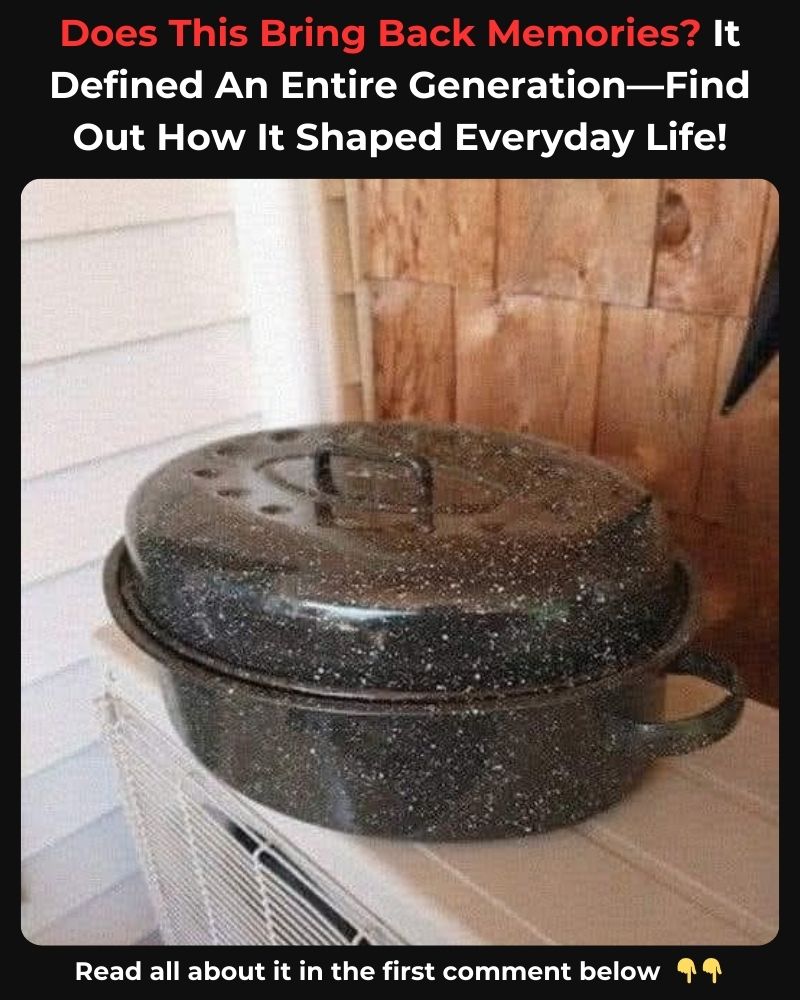In a world dominated by modern cookware with sleek designs and advanced technology, there’s something magical about rediscovering a piece of history—one that graced countless kitchens and brought families together over hearty meals. Enter the vintage enamelware roasting pan, a timeless kitchen companion cherished by generations. This humble yet indispensable piece of cookware was not only a must-have but also a witness to some of the most heartwarming family traditions. Let’s take a trip down memory lane to explore the significance, legacy, and unique stories tied to this culinary classic.
The Origins of Enamelware
The vintage enamelware roasting pan owes its origins to the late 19th century, a time when cast iron was king. Enamelware came as an innovative solution, offering a lightweight, durable, and rust-resistant alternative to heavy iron cookware. The process involved coating steel or cast iron with a layer of enamel, giving the pans their characteristic glossy finish and signature speckled design. The enamel provided a non-reactive surface, making it ideal for cooking acidic dishes like tomato-based stews or roasting meats with marinades.
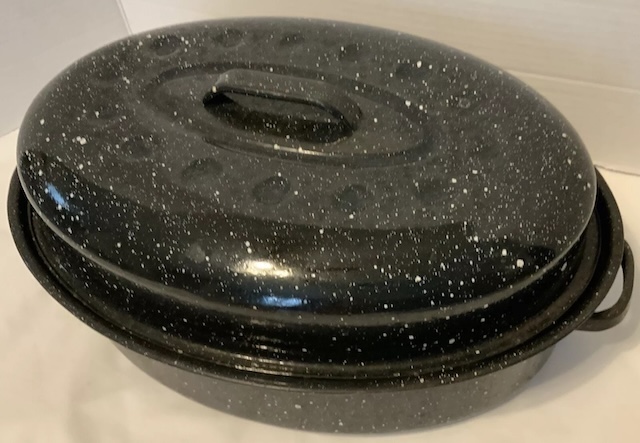
During the early 20th century, these pans became a symbol of efficiency in American households. As ovens became more common, enamelware found its place in nearly every kitchen, prized for its versatility and easy cleanup.
A Pan With Many Roles
The vintage enamelware roasting pan was far from a one-trick pony. Families used it for everything from roasting turkeys during Thanksgiving to baking cobblers for Sunday desserts. Its spacious design made it perfect for preparing large meals, while the tight-fitting lid helped lock in moisture, ensuring meats were tender and flavorful.
One of the pan’s most beloved roles was during holidays. Imagine the aroma of a golden-brown turkey wafting through the house, or the laughter of children waiting eagerly for a baked ham to emerge from the oven. This pan wasn’t just cookware; it was the centerpiece of cherished memories.
A Staple Through The Decades
During the Great Depression and World War II, the vintage enamelware roasting pan became a symbol of resilience. With limited resources, families had to make the most of what they had. This pan became an essential tool for stretching ingredients into hearty meals that could feed large households.
In the 1950s and 60s, the enamelware roasting pan experienced a surge in popularity. The speckled enamel design—available in hues of blue, green, and black—added a pop of color to kitchens while remaining functional. Housewives prized these pans not just for their utility but also for their aesthetic appeal, as they often doubled as serving dishes.
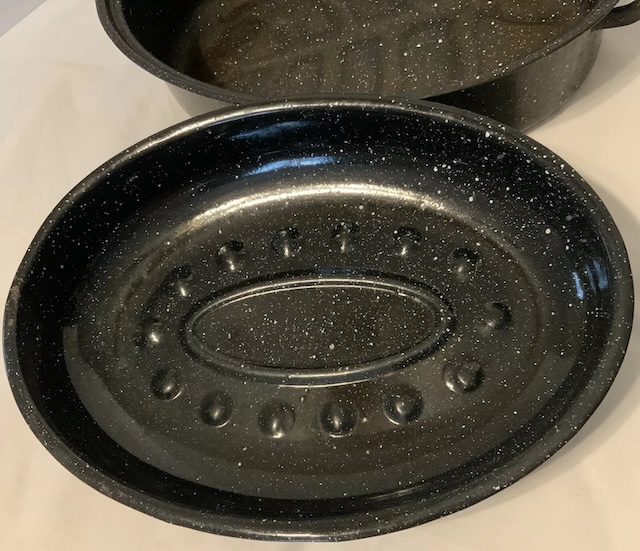
The Stories It Holds
Every vintage enamelware roasting pan has a story to tell. Some pans were passed down through generations, becoming heirlooms that carried the flavors and traditions of family recipes. Others found their way into community gatherings, feeding neighbors at potlucks or church dinners.
One particularly touching story comes from a woman in the Midwest who used her enamelware pan to bake bread every week for over 40 years. The pan, with its slightly chipped enamel and worn edges, became a symbol of her unwavering love for her family. Another story recalls how a farmer’s wife in the 1930s used her roasting pan to make meals for workers during the harvest season, ensuring everyone had a hearty meal to power through their long days.
Why It Was A Must-Have
The vintage enamelware roasting pan was a must-have because it combined practicality with reliability. It could withstand high temperatures, go straight from the oven to the table, and was easy to clean—qualities that endeared it to home cooks everywhere. Its durability meant it could last for decades, becoming a constant in an ever-changing world.
More than its utility, the pan represented a simpler time when meals were slow-cooked, and families gathered without distractions to enjoy one another’s company. It stood for values of togetherness, resourcefulness, and a love for homemade food.
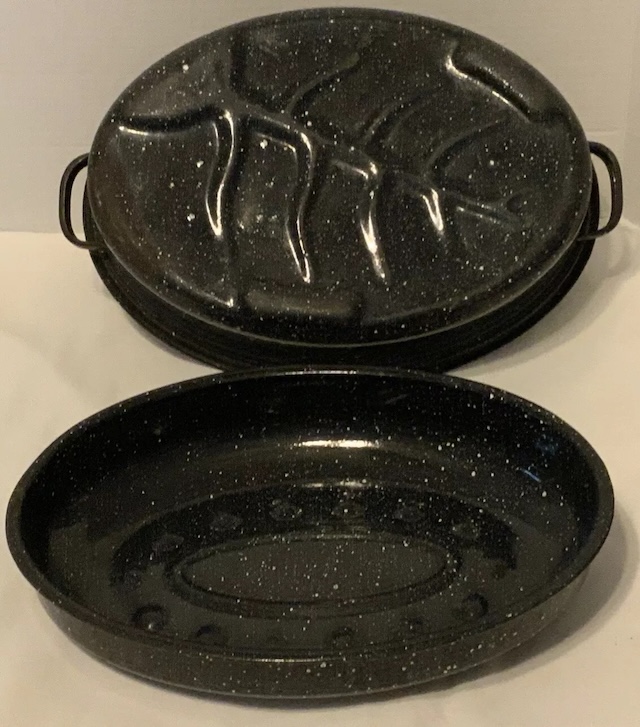
Fun Facts About Enamelware
Celebrity Endorsements: In the 1950s, enamelware gained a celebrity following when television cooking shows started featuring it in their kitchens. It became a status symbol for homemakers.
Speckled Design: The speckled design wasn’t just decorative; it also helped hide wear and tear, making the pans look newer for longer.
Eco-Friendly Before Its Time: Long before sustainability became a trend, enamelware was reusable and designed to last a lifetime.
Modern Resurgence
Today, the vintage enamelware roasting pan is making a comeback, thanks to its nostalgic charm and practical benefits. Vintage collectors seek out these pans at flea markets and antique shops, often restoring them to their former glory. For modern cooks, these pans offer a unique way to connect with the past while enjoying the benefits of high-quality cookware.
Many also appreciate the environmental aspect of reusing vintage enamelware, embracing the idea of sustainable cooking with timeless tools.
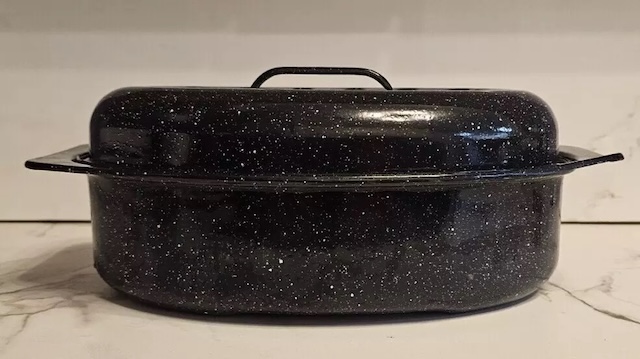
Conclusion: A Piece of History Worth Keeping
The vintage enamelware roasting pan isn’t just a relic of the past—it’s a bridge to the memories and traditions that define our shared culinary heritage. Whether it’s the chipped enamel that tells a story of countless family dinners or the warmth it brought to homes during difficult times, this pan is more than just cookware. It’s a testament to resilience, creativity, and the timeless joy of gathering around the table.
So, the next time you stumble across one of these pans at a yard sale or in your grandmother’s kitchen, remember: it’s not just a pan—it’s a piece of history, a keeper of stories, and a reminder of the flavors of life that truly matter.
